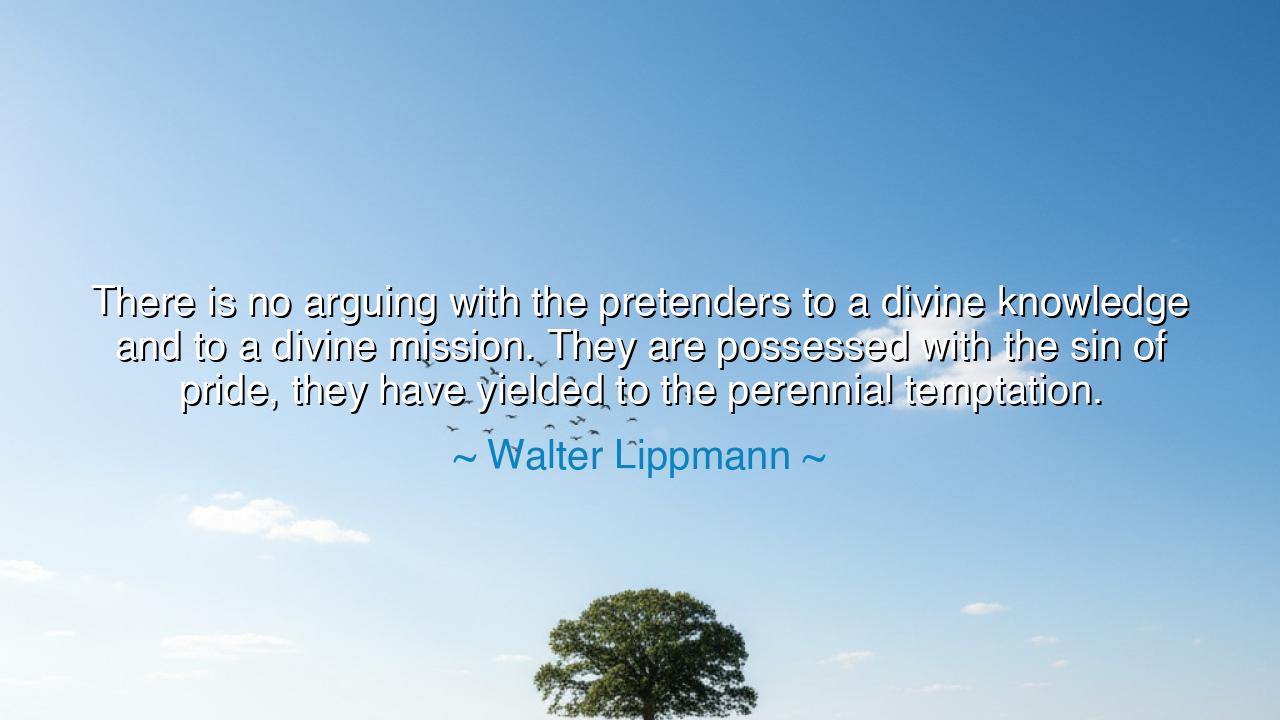
There is no arguing with the pretenders to a divine knowledge and
There is no arguing with the pretenders to a divine knowledge and to a divine mission. They are possessed with the sin of pride, they have yielded to the perennial temptation.






“There is no arguing with the pretenders to a divine knowledge and to a divine mission. They are possessed with the sin of pride; they have yielded to the perennial temptation.” — Walter Lippmann
In this solemn warning, Walter Lippmann speaks as a prophet of humility to an age intoxicated by its own certainty. His words strike at the heart of a timeless human flaw—the delusion of divine knowledge, the pride that makes a man believe he alone holds truth and destiny in his hands. Such a man becomes deaf to reason, blind to doubt, and impervious to correction. He no longer seeks wisdom but worship, no longer learns but commands. This is the sin of pride, the ancient poison that first divided heaven itself, the very perennial temptation that whispers to every age: “You shall be as gods.”
From the dawn of time, this temptation has walked beside mankind. In the garden of beginnings, it took the shape of a serpent offering forbidden knowledge; in the ages that followed, it clothed itself in crowns and robes and banners. Those who pretend to divine knowledge—who claim to know the will of heaven and impose it upon others—have brought ruin upon nations and misery upon souls. For once a man believes himself the vessel of perfect truth, he will stop listening, stop questioning, and at last, stop loving. He becomes not a servant of God, but a tyrant in His name.
History bears grim witness to this truth. Consider the rise of the Inquisition in medieval Europe. Men who believed themselves the guardians of divine will built fires in the name of purity. They burned books and people alike, convinced that they were cleansing the world of sin. Their pride was clothed in piety; their cruelty was baptized in righteousness. They could not be reasoned with, for they believed that to doubt themselves was to doubt God. Yet centuries later, the world saw that their divine mission was but a mask for human arrogance—the same arrogance that had cast Lucifer down from the heights of heaven.
Lippmann’s wisdom was forged in the modern age, yet it echoes the ancients’ deepest understanding: that humility is the foundation of all true wisdom. The philosopher Socrates, who claimed to know nothing, was wiser than those who claimed to know all. He understood that to be human is to stand at the edge of mystery, to see the vastness of what one does not know. The pretenders to divine knowledge, however, cannot bear such uncertainty. They build idols of ideology, and bow before the image of their own minds. Their pride makes them infallible in their own eyes, and thus unreachable by truth.
And yet, this temptation is not confined to kings or prophets; it lives within every soul. Each of us, at times, has felt the pull of certainty—the desire to be right at all costs, to silence those who disagree, to mistake conviction for virtue. In those moments, we, too, flirt with the sin of pride, imagining ourselves as bearers of higher truth. But true divinity does not speak in the voice of domination; it whispers in compassion, in doubt, in the willingness to see others as equally capable of wisdom. To resist the perennial temptation is to remember that no mortal mind can contain the infinite.
Therefore, the lesson is clear: there is no arguing with pride, but there is redemption in humility. Do not seek to conquer others with your truth—seek to understand them. Question even your most sacred convictions, for truth fears no examination. When someone claims to speak with divine certainty, beware—for the greater the claim to heavenly authority, the more it must be tested by human conscience. Wisdom wears the robes of humility, not the armor of arrogance.
In your own life, let this teaching take root. Speak your truth, but hold it lightly. Defend your beliefs, but never let them harden your heart. Remember that even the brightest flame casts a shadow, and that those who claim to see all light may be blinded by their own brilliance. The pretenders to divine knowledge will always walk among us, their pride cloaked in righteousness. But you—choose instead the path of humility, where listening is sacred, and love is the highest form of knowing. For in the end, the wisest of men are not those who claim to know the will of heaven, but those who bow before its mystery.






AAdministratorAdministrator
Welcome, honored guests. Please leave a comment, we will respond soon